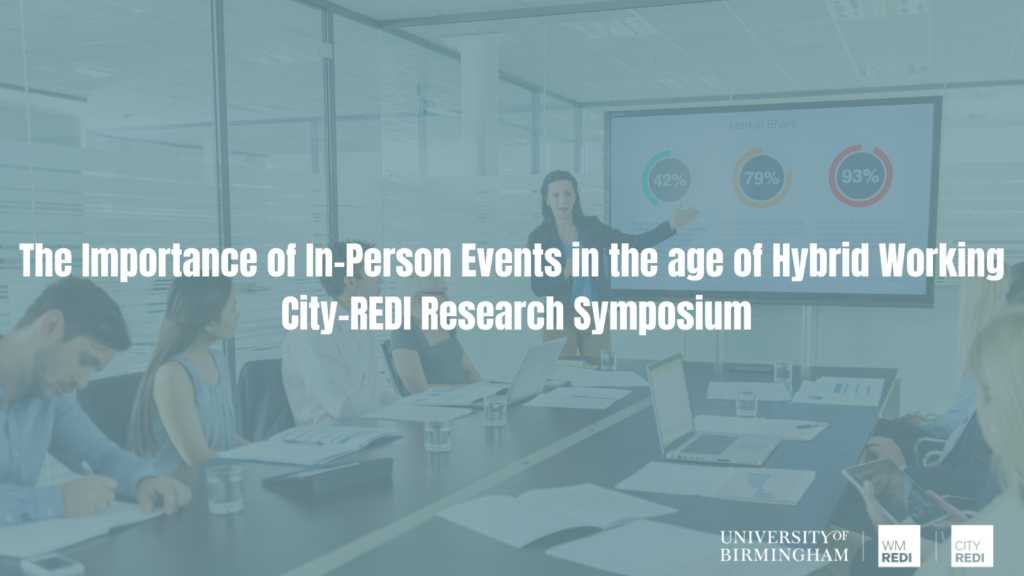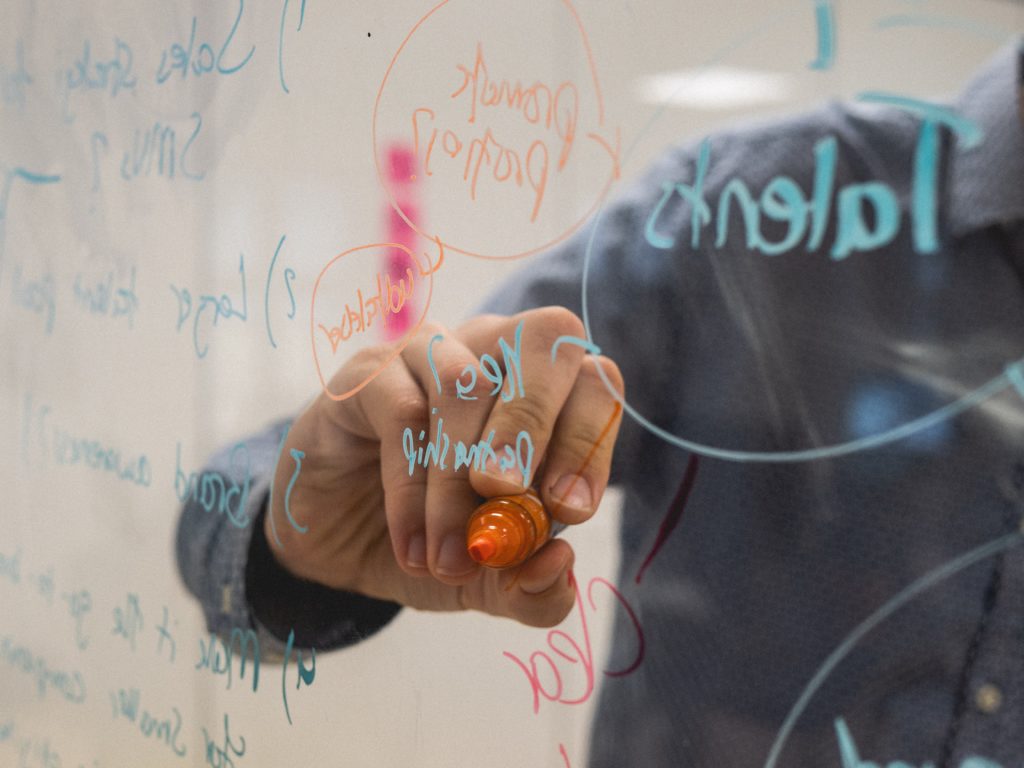
On 17th January, City-REDI held the City-REDI Research Symposium. Johannes Read summaries each presentation and discusses the positive outcomes of the event.
In the age of hybrid working, in-person events have taken on a new meaning. These events curate the chance to connect, share, and collaborate. At City-REDI, the City-REDI Research Symposium (CRRESY) is the bi-annual symposium for researchers, academic and professional services staff in City-REDI/WMREDI to present their projects with the team to support the collaborative nature of our work.
Following a two-year stint of hosting CRRESY as an online-only event, the symposium returned to campus with a round-robin of eight snappy presentations. The quick-fire nature of the event nurtured an environment for furthering our work, as well as a buzz of coming together on campus. This blog outlines summaries of the sixth CRRESY event.
The Impact of a Person-centred Start-up Accelerator on Participating Firms: Juliane Schwarz
The poster presents the results of an in-depth case study of a business start-up accelerator. It discusses the impact on participating founders and their new business venture, e.g., an increase in skills, confidence, networking, access to finance, and business formation and growth. My questions (introduced during the one-minute pitch) are about whether or not the analysis is comprehensible and how to turn it into an academic article that is accepted for publication.
The format of the presentation (short and to the point) helps to focus on the main aspects to which feedback is needed, to present to four groups in succession is very intense but also exhilarating, feedback has been very good and highly relevant, and the small group (3-5 participants) helps to go into more detail and encourages contribution by participants who would not normally contribute. It is a helpful and good format if highly intense, like speed dating with and for your research.

Research & Development Workforce and Skills: Kostas Kollydas
“People and Talent” is the second pillar of the UK Innovation Strategy, and it places an emphasis on the importance of creating a workforce that is both diverse and highly skilled, so that businesses can meet changing demands and effectively implement innovations. This is becoming increasingly crucial in light of climate change, the Fourth Industrial Revolution, Covid-19, and skills mismatches.
The R&D Workforce & Skills project looks at how participation rates in R&D-related occupations vary across UK regions by demographics, education level, and industry. It also explores qualitatively the barriers to equality, diversity, and inclusion in the R&D workforce, the importance of education and training systems in fostering R&D talent, and the difficulties employers experience in attracting and retaining R&D employees.
The new CRRESY format was more interactive, allowing team members with diverse research backgrounds to engage in stimulating discussions, receive constructive feedback, and gain a good understanding of current projects in the institute.
The role of universities and stakeholders in local skills ecosystems insights from international case studies: Abi Taylor
This project investigates the skills systems in different countries, with a specific focus on the relationship between universities and other types of tertiary education institutions.
It aims to identify what makes a strong local skills system and use this information to make comparisons with the skills system of England, outlining lessons which city regions in England can learn from.
In summary, there are three main takeaways. The first is that universities operate across different local / city-regional / national/international spheres. University bureaucracy means universities can struggle to react agilely to changing employer skills needs but we identified examples of strong collaboration. Second, it is important for universities to create flexible opportunities for the adult population to upskill. And thirdly, it is important to hold policy and institutional stability as well as informal and formal fora to coalesce stakeholders around shared priorities are key aspects of strong local skills ecosystems.

Blogging at City-REDI: Stuart Mitchell
This presentation focused on blogging at City-REDI and what academics and other staff might gain from blogging. Blogging helps increase the exposure of their work by writing in a simple and engaging way and accessing a wide range of networks through posting on the City-REDI blog site to increase the impact of their work. We looked at potential opportunities to blog, and how to blog, and highlighted some good resources to help with the writing process. Finally, we talked about what some of the barriers might be that stop people from blogging. It was a fantastic opportunity to hear directly from staff members about what the issues were that put them off blogging, and it’s given us insight into how the team could support each other to blog more for the Institute.

Marketing and Communications at City-REDI: Ellie MacDonald
My presentation looked at how the marketing and communications team can help you and your work reach more people from podcasts and videos to webpages to helping you develop a social media presence. I went through the importance of social media and the significance of developing a project webpage for promoting awareness of, and sharing outputs from, our research. The feedback I received was that people need reminders that they need to send us papers they write. The discussions we held were positive, especially with people coming up with ideas for content.
CRRESY helped me to answer and explain any social media jargon, such as ‘impressions’ of posts, and eliminate any potential worries.

Smart Energy- An Energy System for the 21st Century: Annum Rafique
The Smart Energy- An Energy System for the 21st Century is commissioned research collaboration between the University of Birmingham (UoB), Energy Research Accelerator (ERA) and Siemens for the Midlands Engine. The report sets out the benefits to the Midlands Engine region from an accelerated shift to a Smart Energy System and why, with the right innovation and support mechanisms, this can provide a net benefit to energy consumers and businesses in the region and beyond. The net-zero transition is underpinned by a low-carbon energy system, and smarter energy systems provide the basis for achieving a secure, resilient energy system at a lower cost than would otherwise be the case.
In order for the Midlands to become an exemplar for Smart Energy, the region will need to work with key organisations to build a Smart Energy System based on implementing projects and programmes. This will support the UK’s energy systems transition by maximising the benefit that smart systems offer, not only for the Midlands itself but also for the UK as a whole. It is concluded from the present work that there is a credible basis for the Midlands taking a leading role in this sector.
Communities in Energy Transition: Engaging with Decarbonisation and Net Zero in the UK: Sara Hassan
The UK has committed to reaching net zero carbon emissions by 2050. Currently, UK cities embark on work that sets out how and what needs to change to decarbonise the UK without leaving people and place behind. While the industry sectors are trying to shift away from carbon-intensive manufacturing and using depletable energy sources, the emissions in the transport and housing sectors have seen little progress so far.
This project seeks to understand communities and how community assets can be mobilised to address energy problems and social inequalities. There is a clear gap in communities’ adoption of different low-carbon technologies and behaviours in areas of urban deprivation. However, numerous participatory planning experiences in the UK reveal a wealth of unused lived experiences. This research project seeks to mine for this rich data and focuses on East Birmingham as a pilot. This is not only timely but crucial to evidence of how a zero-carbon pathway can underpin a more socially just future.

“A New Britain” Reviewed: Matt Lyons & Charlotte Hoole
In December 2022 Keir Starmer presented a new report: A New Britain: Renewing our Democracy and Rebuilding our Economy and promised “The biggest ever transfer of political power out of Westminster and into the towns, cities, and nations of the UK”. The report was produced by The Commission on the UK’s Future, an organisation chaired by former Prime Minister Gordon Brown. The report provides 40 recommendations across a range of themes covering various facets of the UK’s constitutional arrangement. This presentation focused on two of the major themes of the report found in chapter 7 “The Right Powers in the Right Places” Section 1: Devolution within England and Section 2: “Supporting Economic Development”.
The presentation aims to gather feedback from colleagues on two main areas: i) how what is proposed in the report differs from the Levelling Up White Paper proposals. ii) What could this mean for the Midlands.
The updated format for CRRESY was very helpful in gathering comments and advice from colleagues across the institute with expertise in different areas covered by the report.
This blog was written by Hannes Read, Policy and Data Analyst, City-REDI / WMREDI, University of Birmingham.
Disclaimer:
The views expressed in this analysis post are those of the authors and not necessarily those of City-REDI or the University of Birmingham.
